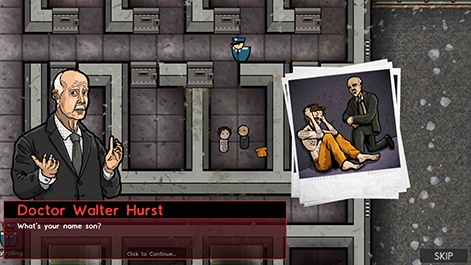After the success of Prison Architect, the success of developer Introversion Software’s following title was something of a sure thing.
The studio’s previous release had sold in the region of two million players and generated well over $19m in sales.
But Introversion’s next project was anything but a financial success. To put it lightly, the exploration-focused Scanner Sombre absolutely bombed, with the game selling 7,500 copies in its first three months on sale.
“We've had flops in the past, and I've always been able to point to things that I thought were the problem,” managing director Mark Morris tells PCGamesInsider.
“With Scanner, it's very difficult because everything kind of went well. If you look at its review scores, they're a little bit divisive. We have 80s from the likes of PC Gamer – if they're saying your game is 80 per cent you know you have done well. Now there are other games that have given us a lower score but we accept them. The game itself is actually pretty good. It's not mind-blowing but it's alright.
“The marketing campaign was strong and I wonder if this was the problem because the only thing that we had ever found that moved the sales needle for Prison Architect was YouTubers. Spending money outside of YouTube was really ineffective. If you have one of the big channels running a video series on you, I'd see a spike in sales. We assumed there was this magic 1:1 mapping between YouTube sales and video game sales. We absolutely did not experience that with Scanner. I wonder if that's because Scanner is a single playthrough experience; there's not a huge amount that you do, there's not much player choice. It's about exploration and the environment rather than there being a huge amount of skill. The working theory for us is that potentially a lot of players watched the YouTubers and consumed the content that way.
“The other one is that with the current standard people expect from games – so much comes out, most of which fades into oblivion. That's just the environment we are in now. We don't really know. I can't give you anything more insightful as to why it didn't do well. People might say the game wasn't very good; they might ask why we'd move away from our core audience with Prison Architect. We never expected it to sell millions of copies, that was never the plan. We just wanted it to make its money back which is probably about 50,000 players. At last check [interview was conducted at the end of June] we're at about 7,500. I don't know. Are there really not enough gamers that want to play that kind of game? Is it genuinely that it's the power curve on Steam is so steep indeed and if you don't hit the big sales at launch, you are doomed to tiny sales. We're still wrestling with this.”

We suggest that maybe following the long development and release process the studio had with Prison Architect, releasing a ‘regular’ game might be a difficult adjustment for the team.
“It's easier with Early Access,” Morris admits. “Well, it certainly was with Prison Architect. I don't know if it's changed. You have these multiple bites of the cherry. If I got 5,000 players at the end of month one with an Early Access game I'd be pretty happy with that. You know you can drop an update and you'll hopefully pick up more players then you are dead in the water. But if you pick up 1,000 a month or something then that's probably going to be enough to keep you going for quite a while. If you can get that traction then your ability to market and promote an Early Access game is a much easier proposition. As long as the proposition is good enough to get those people involved in it in the first place.
“If you do something that people really weren't interested in, if Scanner had been an Early Access game with lots of updates, it might still not have been enough to draw people in. Early Access games are easier to market, but they have draw backs of their own. You've got to be able get content out regularly. If you aren't doing that, then people are going to lose interest so there's only a certain type of game that'll be amenable to that. For us, creatively, we didn't want to move into another five-year project. We wanted to do something a little snappier, faster, probably driven a bit by VR as well if I'm honest. No-one knew how VR was going to pan out. We thought that Scanner would be great in VR and it is great in VR. So that's something we had in our back pocket. I don't know whether just because we did Prison Architect last time, people have rebelled and decided not to buy Scanner. They probably looked at it and thought it wasn't their cup of tea.”

It’s also pretty refreshing to see a games company put its hands up and say its project hasn’t done well. Too often in this market we see companies evade or spin the news that their games have not sold well.
“I don't understand why people are so quiet about this stuff,” Morris says.
“I’ve been reaching out to a few people to try and manage Scanner moving forwards. We don't want to abandon it. It's a good piece of work and I want to get it in front of people. A little part of me goes: 'Why am I being so honest? Why send emails out with sales figures?’, but another part of me says that anyone can look it up on SteamSpy, anyone can check out the number of reviews on Steam. I don't want to go into a new partnership with somebody and say how well Scanner did, only have to explain the situation to them after they've done some due diligence. You just look like a dick trying to pull the wool over people's eyes.
“One of the reasons that people close to the industry like Introversion is because of our candour and honesty. When things don't go according to plan, it's just as important, if not more important, to talk about it, than when they do go to plan. We don’t really know why Scanner did quite so badly. But by talking about it openly and honestly, you get people talking about it. If someone asked whether I regret doing, I guess not.”
As Morris says, he’s keen to continue work on Scanner Sombre and that the game’s problems aren’t going to get in the way of Introversion’s future.
“We don't want to change from where we are,” he explains.
“We're a nice sized team, there's about ten of us We get to make the kinds of games that we want to make and no-one at the firm wants us to grow into an enormous dev studio. There's no ambition to get bigger and bigger and sell and exit. Day-to-day, we're doing what we want to be doing. We have all carved out lives around this way of working. The ambition for Introversion is to be together and still be making games in ten or 20 years time. That's the plan. How we do that is a separate question, and the answer is difficult to give.
“The industry is always changing and moving on. Early Access and what we did with Prison Architect had so many benefits. We didn't move away from that because we thought that we could do better. We moved away because we wanted a bit of a break from the grind. Where we are right now is a position where we have had that break and are once again hungry for success and ready to get back to it.
“We're currently looking at new ideas that would suit that development model and we'll turn them into real things and put them in front of people and see how the world reacts. That's also part of why I love our industry so much; if it doesn't work, then things will change again for us. Prison Architect has given us a very firm footing to be able to do this for a good while. If it's successful then brilliant, we'll crack. If not, we'll have to look at a phase of Introversion. We've been through several phases in the past and maybe there's a new way of doing this. Often in the industry it's been spoken about having a very small core team that expands once there's a project and goes away afterwards. Maybe that's what we'll look at doing. I don't want the people who work for me to get worried because we're not there yet.
"But that is a possible future – where we're able to really scale up and down as is necessary and it takes the pressure off after a game has come out until we're ready to put a team together that's going to deliver the next thing.”














